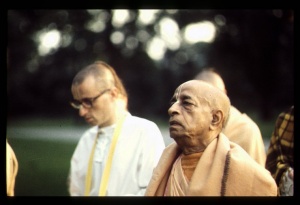SB 6.18.74: Difference between revisions
m (1 revision(s)) |
No edit summary |
||
| Line 1: | Line 1: | ||
{{info | {{info | ||
|speaker=Demigod King Indra | |speaker=Demigod King Indra | ||
|listener=Diti, wife of | |listener=Diti, wife of Kaśyapa Muni | ||
}} | }} | ||
[[Category:Srimad-Bhagavatam - Canto 06 Chapter 18]] | |||
[[Category:Bhagavatam Verses Spoken by Lord Indra - Vanisource|061874]] | |||
<div style="float:left">'''[[Srimad-Bhagavatam]] - [[SB 6|Sixth Canto]] - [[SB 6.18: Diti Vows to Kill King Indra|Chapter 18: Diti Vows to Kill King Indra]]'''</div> | |||
<div style="float:right">[[File:Go-previous.png|link=SB 6.18.73]] '''[[SB 6.18.73]] - [[SB 6.18.75]]''' [[File:Go-next.png|link=SB 6.18.75]]</div> | |||
{{RandomImage}} | |||
==== TEXT 74 ==== | ==== TEXT 74 ==== | ||
<div class="verse"> | |||
<div | :ārādhanaṁ bhagavata | ||
ārādhanaṁ bhagavata | :īhamānā nirāśiṣaḥ | ||
īhamānā nirāśiṣaḥ | :ye tu necchanty api paraṁ | ||
ye tu necchanty api paraṁ | :te svārtha-kuśalāḥ smṛtāḥ | ||
te svārtha-kuśalāḥ smṛtāḥ | |||
</div> | </div> | ||
| Line 17: | Line 22: | ||
==== SYNONYMS ==== | ==== SYNONYMS ==== | ||
<div class="synonyms"> | |||
<div | ''ārādhanam''—the worship; ''bhagavataḥ''—of the Supreme Personality of Godhead; ''īhamānāḥ''—being interested in; ''nirāśiṣaḥ''—without material desires; ''ye''—those who; ''tu''—indeed; ''na icchanti''—do not desire; ''api''—even; ''param''—liberation; ''te''—they; ''sva-artha''—in their own interest; ''kuśalāḥ''—expert; ''smṛtāḥ''—are considered. | ||
</div> | </div> | ||
| Line 25: | Line 29: | ||
==== TRANSLATION ==== | ==== TRANSLATION ==== | ||
<div class="translation"> | |||
<div | |||
Although those who are interested only in worshiping the Supreme Personality of Godhead do not desire anything material from the Lord and do not even want liberation, Lord Kṛṣṇa fulfills all their desires. | Although those who are interested only in worshiping the Supreme Personality of Godhead do not desire anything material from the Lord and do not even want liberation, Lord Kṛṣṇa fulfills all their desires. | ||
</div> | </div> | ||
| Line 33: | Line 36: | ||
==== PURPORT ==== | ==== PURPORT ==== | ||
<div class="purport"> | |||
When Dhruva Mahārāja saw Lord Viṣṇu, he declined to take any benedictions from Him, for he was fully satisfied by seeing the Lord. Nonetheless, the Lord is so kind that because Dhruva Mahārāja, in the beginning, had desired a kingdom greater than his father's, he was promoted to Dhruvaloka, the best planet in the universe. Therefore in the ''śāstra'' it is said: | |||
:''akāmaḥ sarva-kāmo vā'' | |||
:''mokṣa-kāma udāra-dhīḥ'' | |||
:''tīvreṇa bhakti-yogena'' | |||
:''yajeta puruṣaṁ param'' | |||
"A person who has broader intelligence, whether he is full of material desires, free from material desires, or desiring liberation, must by all means worship the supreme whole, the Personality of Godhead." ([[SB 2.3.10]]) One should engage in full devotional service. Then, even though he has no desires, whatever desires he previously had can all be fulfilled simply by his worship of the Lord. The actual devotee does not desire even liberation (''anyābhilāṣitā-śūnyam'' [''Bhakti-rasāmṛta-sindhu'' 1.1.11]). The Lord, however, fulfills the desire of the devotee by awarding him opulence that will never be destroyed. A karmī's opulence is destroyed, but the opulence of a devotee is never destroyed. A devotee becomes more and more opulent as he increases his devotional service to the Lord. | |||
</div> | |||
" | <div style="float:right; clear:both;">[[File:Go-previous.png|link=SB 6.18.73]] '''[[SB 6.18.73]] - [[SB 6.18.75]]''' [[File:Go-next.png|link=SB 6.18.75]]</div> | ||
</div> | __NOTOC__ | ||
__NOTOC__ | __NOEDITSECTION__ | ||
Revision as of 15:11, 14 May 2021

A.C. Bhaktivedanta Swami Prabhupada
TEXT 74
- ārādhanaṁ bhagavata
- īhamānā nirāśiṣaḥ
- ye tu necchanty api paraṁ
- te svārtha-kuśalāḥ smṛtāḥ
SYNONYMS
ārādhanam—the worship; bhagavataḥ—of the Supreme Personality of Godhead; īhamānāḥ—being interested in; nirāśiṣaḥ—without material desires; ye—those who; tu—indeed; na icchanti—do not desire; api—even; param—liberation; te—they; sva-artha—in their own interest; kuśalāḥ—expert; smṛtāḥ—are considered.
TRANSLATION
Although those who are interested only in worshiping the Supreme Personality of Godhead do not desire anything material from the Lord and do not even want liberation, Lord Kṛṣṇa fulfills all their desires.
PURPORT
When Dhruva Mahārāja saw Lord Viṣṇu, he declined to take any benedictions from Him, for he was fully satisfied by seeing the Lord. Nonetheless, the Lord is so kind that because Dhruva Mahārāja, in the beginning, had desired a kingdom greater than his father's, he was promoted to Dhruvaloka, the best planet in the universe. Therefore in the śāstra it is said:
- akāmaḥ sarva-kāmo vā
- mokṣa-kāma udāra-dhīḥ
- tīvreṇa bhakti-yogena
- yajeta puruṣaṁ param
"A person who has broader intelligence, whether he is full of material desires, free from material desires, or desiring liberation, must by all means worship the supreme whole, the Personality of Godhead." (SB 2.3.10) One should engage in full devotional service. Then, even though he has no desires, whatever desires he previously had can all be fulfilled simply by his worship of the Lord. The actual devotee does not desire even liberation (anyābhilāṣitā-śūnyam [Bhakti-rasāmṛta-sindhu 1.1.11]). The Lord, however, fulfills the desire of the devotee by awarding him opulence that will never be destroyed. A karmī's opulence is destroyed, but the opulence of a devotee is never destroyed. A devotee becomes more and more opulent as he increases his devotional service to the Lord.